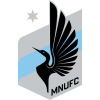Decision Day is in the rearview mirror, which means it’s time to look ahead to the Audi 2021 MLS Cup Playoffs. And I think it’s helpful to use this little lull between the regular season and postseason to learn more about the playoff field.
Earlier this week, we looked at the seven Eastern Conference playoff teams and identified one strength and one weakness for each of them. Today, we’re going to do the same thing with the Western Conference using Second Spectrum’s data.
Seven teams. Seven strengths. Seven weaknesses. Let’s do this thing.
Strength: Transition attacking
The Colorado Rapids did it. They won the Western Conference with the lowest wage bill in all of MLS and earned themselves a Round One bye. There’s a lot to like about Robin Fraser’s team, but one of the things that really stands out is their dangerous transition attacks. Colorado are third in MLS in xG created against a recovering defense, which could serve them quite well against some ambitious teams in the playoffs.
Weakness: No dominant goalscorer
Up front, I want to say it’s possible this weakness is a strength. After all, the Rapids earned 61 points and won the West without a dominating goalscorer, so there’s every chance they could continue to march forward with their goalscoring by committee approach. Still, it’s fair to have concerns about who is going to put the ball in the back of the net for Colorado. Their leading scorer was Michael Barrios (8), while Jonathan Lewis was close behind (7) in second.
Strength: Strong defending
Seattle have attacking and midfield firepower we all love to discuss, but they can also absorb attacks like few others across MLS. They allow the smallest amount of open-play xG per game of any team in the West and have allowed the fewest open-play goals in the league. The Sounders don’t spend much time high-pressing. Instead, they tend to shift laterally and pressure the ball in deeper areas – only two teams average more pressures per game in their own half than Seattle.
Weakness: Lack of touches in key attacking spots
The Sounders have attacking talent, but some of their offensive numbers aren’t all that strong. They only generate the 14th most open-play xG per game and they don’t regularly move the ball into key attacking areas. Seattle are 23rd in MLS in touches per game in the box and Zone 14 – the only teams behind them are Houston, Cincinnati, Miami and Vancouver. Brian Schmetzer’s team tends to progress through the wings, but a lack of presence in central areas could hurt their postseason goalscoring.
Strength: Possession principles
SKC’s possession play is some of the best in MLS. They’re well-drilled, fluid and (most importantly) dangerous. Kansas City are fifth in MLS in open-play xG and they regularly use possession to break into high-value areas. With their commitment to possession (they have the second-longest possessions and the second-most passes per possession in MLS), Sporting can quickly take the air out of the game for their opponents.
Weakness: High-pressing effectiveness
Peter Vermes wants his team to high-press … and they do. Only the New York Red Bulls register more team presses per game in the final third than Sporting Kansas City. However, despite their pressing frequency, SKC are just 12th in MLS in terms of pressing efficiency on those team presses in the final third. Playoff opposition may be able to take advantage of the gaps in that press.
Strength: A Sebastian Blanco-led attack
Since Sebastian Blanco started getting regular minutes for the Timbers around the beginning of August, Portland’s attacking numbers have been excellent. Since Aug. 1, only two teams have put together more open-play xG per game than Portland. Blanco, for his part, is operating on all cylinders: Since Aug. 1, he’s fourth in MLS in xA and is in the 99th percentile among players in terms of xA per 90 minutes. His return from injury is immense for Gio Savarese's side.
Weakness: Open-play and restart defending
The underlying numbers don’t think very highly of Portland’s defensive work this season. Per Second Spectrum, the Timbers have allowed the fourth most open-play xG in MLS and they have allowed the most xG from free kicks and corner kicks in MLS. Their defensive numbers are looking up over the last six weeks, but this should still be a concern for the Rose City side.
Strength: Chance creators
With Emanuel Reynoso and Franco Fragapane respectively operating in the central attacking midfield spot and left midfield spot in Adrian Heath’s 4-2-3-1 formation, Minnesota boast an impressive pair of chance creators. Reynoso is sixth in MLS in xA this season and in the 97th percentile among regulars in xA per 90 minutes. Fragapane, for his part, is in the 93rd percentile among regulars in xA per 90 minutes. The two Argentines have the potential to cause major problems for opponents in the playoffs.
Weakness: Pressing effectiveness
Minnesota United’s defensive shape looks different than Sporting KC's, but they both have a similar defensive issue: they like to press, but they don’t win the ball at an elite level in those moments. Minnesota average the seventh most team presses in the final third per game in the league, but they’re all the way down in 23rd in terms of pressing efficiency on those high-presses. Balancing pressing with defensive solidity will be essential for Minnesota’s postseason push.
Strength: Ball-winning in the middle third
Statistically, we haven’t yet figured out how to quantify Vanni Sartini (I do have some ideas about xVS, though, so call me, Second Spectrum). With that in mind, the numbers don’t reflect very kindly on the Whitecaps, even in the Sartini era. One thing Vancouver's really good at, though, is engaging and winning tackles in the middle third. They have the seventh-best tackle win rate in the middle third in all of MLS and have a team-wide commitment to defending in that area.
Weakness: Attacking threat
As fun as the Whitecaps have been down the stretch (and as darn good as Brian White and Ryan Gauld have been), this team still struggles to string quality shooting opportunities together. Since Sartini took over, Vancouver are 23rd in MLS in open-play xG per 90 minutes. Could they get hot and cause problems for SKC? Of course. But it’s entirely possible some of their offensive woes creep to the forefront in Round One.
Strength: Opening up games
Pablo Mastroeni’s time in charge of Real Salt Lake has been chock full of goals. Since Mastroeni was named interim manager on Aug. 27, RSL have the second most open-play goals in MLS (24) and the fourth most expected goals. Mastroeni has given his team freedom to control the ball, move forward in possession and open up games en route to creating chaos for opposing defenses.
Weakness: Opening up games
That freedom has also led to RSL creating a bit of chaos for themselves. Opening games by possessing the ball and pushing numbers forward is all well and good, but without proper defensive solidity to balance that freedom, defending takes a backseat. That’s exactly what’s happened to RSL. From Aug. 27 through Decision Day, only three teams have given up more open-play xG and only two teams have given up more open-play goals than RSL. RSL could end up living and dying by the open game in the playoffs.

















